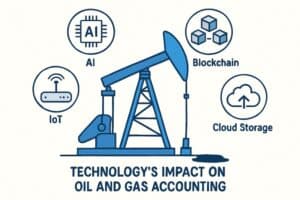Introduction
Technological innovation is rapidly changing the landscape of the oil and gas industry, particularly in accounting practices where accuracy, efficiency, and transparency are vital. Companies are leveraging sophisticated tools, from artificial intelligence to blockchain, to streamline processes and gain actionable insights. Today, oil and gas accounting goes far beyond balancing the books; it is about leveraging next-generation digital solutions to maximize value and ensure compliance in an increasingly complex energy sector.
As the industry grapples with volatile markets, regulatory shifts, and rising sustainability pressures, adopting modern accounting technologies becomes a strategic advantage. The following sections explain how the sector’s pioneers are implementing technology to transform day-to-day operations for greater competitiveness and resilience.
Artificial Intelligence and Machine Learning in Accounting
Artificial intelligence (AI) and machine learning (ML) are fundamentally reimagining accounting workflows in oil and gas. These technologies digest enormous datasets from fields, sensors, and financial records to spot inefficiencies, predict equipment failure, and automate error-prone manual tasks. For example, Shell’s use of AI-driven predictive maintenance led to a 35% reduction in unplanned downtime and savings of $2 billion annually. This level of automation not only safeguards continuity but also improves compliance and reduces operational risk.

Blockchain for Enhanced Transparency
Blockchain is establishing itself as the gold standard for secure, transparent financial transactions within the industry. Its decentralized ledger technology underpins everything from contract management to royalty payments, minimizing the risks of fraud and ensuring all stakeholders can trust the numbers they see. With blockchain, supply chains become auditable; every step of the process, from extraction to end sale, is tracked, significantly reducing disputes and speed bumps in revenue allocation. The result: greater efficiency, easier regulatory periods, and a boost in stakeholder confidence.
Internet of Things: Real-Time Data Collection
The deployment of Internet of Things (IoT) devices throughout oil fields and facilities delivers real-time data streams critical to both operations and accounting. Sensors monitor everything from equipment health to environmental metrics, bypassing delays and errors associated with manual reporting. BP’s “Plant Operations Advisor” exemplifies this, using IoT to spot anomalies before they escalate, reduce unexpected shutdowns, and optimize asset performance. These timely insights empower accounting teams to create more accurate forecasts and respond faster to cost overruns or compliance needs.
Digital Twins: Virtual Asset Management
Digital twins—dynamic, virtual replicas of physical assets—are emerging as game changers for asset management in oil and gas. Continuously updated with live IoT data, they give engineers and accountants the ability to simulate process changes, anticipate equipment behavior, and manage facilities more efficiently. Chevron, for instance, uses digital twin technology to test modifications virtually before implementing them, which has led to 2–5% improvements in operational efficiency and notable cost savings across its global refineries.
Robotic Process Automation: Streamlining Tasks
Robotic Process Automation (RPA) is rapidly replacing labor-intensive, repetitive processes such as invoice processing, expense auditing, and compliance reporting. By automating these tasks, RPA significantly reduces human error and shortens cycle times, freeing accountants to focus on higher-impact areas like forecasting and strategic analysis. In many leading firms, RPA powers seamless supply chain transactions and regulatory submissions, providing a measurable uptick in productivity and accuracy.
Advanced Data Analytics for Decision-Making
Advanced analytics are reshaping accounting decisions by processing and visualizing large, complex datasets for actionable insights. In oil and gas, this means better production forecasts, improved risk assessments, and more data-driven resource allocation. Firms report up to 5% increases in production and 10% reductions in losses through the use of modern analytics platforms. These tools equip finance and operations leaders with the knowledge required for agile, proactive decisions, a clear differentiator in volatile markets.
Cloud Computing: Scalable and Secure Data Storage
Cloud computing has become the backbone of digital accounting transformation, offering scalable storage, secure backup, and anytime, anywhere access to mission-critical data. By transitioning to cloud-based systems, oil and gas companies reduce IT overhead, bolster disaster recovery, and foster seamless cross-location collaboration. Projections indicate industry-wide cloud investments will exceed $20 billion by 2025, reflecting a shift toward efficient, future-ready accounting infrastructure.




